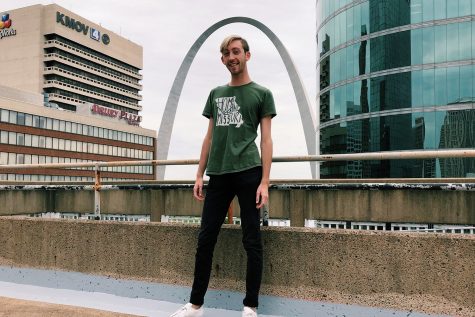Amendment 3: Created by and for Dirty Politics
Growing up in central Missouri, I always wished that I lived in a more exciting state like Florida or California. I spent most summers on the tire swing at my grandparents’ farm and looking at the rows and rows of useless corn. It was boring compared to what I imagined I’d be doing if I lived somewhere else.
When I return to that farm now, I relax. I push my little cousins on that tire swing and I gaze at the rows and rows of corn that will eventually be converted into biofuel. I am fully present in my state. When I think of Missouri, I think of competing in agricultural contests in my high school FFA chapter (Future Farmers of America). When I think of Missouri, I think of walking the streets of St. Louis as a young adult. When I think of Missouri, I think of the countless trips my friends and I have made to Jefferson City to walk around the state capitol building. To me, that building has always been the epitome of the state. Everyone was represented there: the urban dwellers from St. Louis and Kansas City, the college students from Columbia and Springfield, and the farmers from all over.
In recent years the state capitol building has taken some hits. We had a governor who threatened his mistress with revenge porn. Partially as a result of that, half of our current statewide officials were never actually elected to their positions. Now, the state government is trying to overturn the will of the people. As it turns out, Missouri is much more exciting than I realized as a kid—but when it comes to politics it’s not for any good reasons.
But amidst all of this turmoil there have been moments of pride. During the 2018 election, Missouri voters passed Amendment 1, otherwise known as Clean Missouri. Clean Missouri was a ballot initiative that sought to limit campaign contributions and lobbyist gifts for state legislators. It also set up a new system of drawing legislative district lines so that minorities are more equally represented at the capital and so that the partisan makeup of the government accurately reflects the people they claim to represent.
Clean Missouri passed with 62% of the popular vote. This was an election where Josh Hawley (a Republican) was elected to the U.S. Senate with 51% of the vote, so it was obviously widely supported by Missourians across the entire political spectrum. But that shouldn’t be a surprise- after all, who would be against getting rid of government corruption?
Unfortunately, the government itself is against limiting corruption. Even though the people of Missouri overwhelmingly voted to amend the constitution and uphold Clean Missouri, the Republican super-majority in Jefferson City decided that the will of the people should just be cast to the wayside.
For the 2020 election, state Republicans put forward Amendment 3, which some people have taken to calling “Dirty Missouri.” On the ballot, Dirty Missouri looks like it would clean up corruption. It says it would fix the same issues as Clean Missouri: limiting campaign contributions and lobbyist gifts and reformatting legislative districts. But it’s a trick. Dirty Missouri is just a weaker version of Clean Missouri, written in a way that looks like it will clean up the mess in Jefferson City. State Republicans readjusted the numbers for the campaign contribution limits and lobbyist gifts so that it wouldn’t affect them as much. But the main differences between Clean and Dirty Missouri come down to the reformatting of the legislative districts.
Instead of placing a non-partisan state demographer in charge of redistricting, as was proposed and passed by Clean Missouri, Dirty Missouri gives that power to the governor to appoint whomever they please to make those decisions. Dirty Missouri even goes as far as to prohibit Missouri judges from overturning the governor’s maps. Dirty Missouri will make sure that those already in power cannot be toppled from their throne.
Why are state Republicans so hell-bent on retaining power? After all, isn’t Missouri a “safe” Republican state? It’s probably because their policies are not actually popular with Missourians. In the 2020 primary, Missouri voted to expand Medicaid. In the 2018 primary, Missouri voted against Right to Work. Neither of those election results were supported by Missouri Republicans, but since they hold majorities in both the Missouri General Assembly and Senate, as well as the governorship, Missouri Republicans think they can rig the system and steamroll our election results.
The state capitol building in Jefferson City, the place where I spent so many summers with my friends, now just stands as a symbol of state-run corruption. Amendment 3 is a punch to the face of Missouri voters. State Republicans don’t care what Missourians think, and they refuse to let us make changes within our own government. The ambitions of Amendment 3 are clear: they simply want to undemocratically control the state of Missouri, and repress the will of the people in the process.
Voting “No” on Amendment 3 may be our last chance to stop that from happening.
Your donation will support the student journalists of Saint Louis University.






